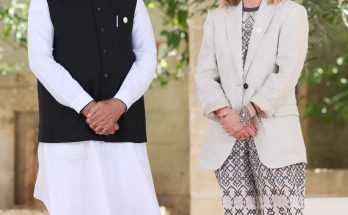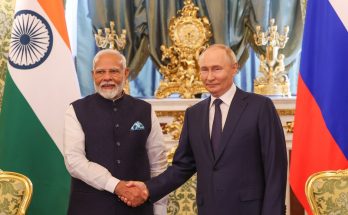By Shakti Sinha
The breast-beating in some strategic circles in Delhi over the perceived loss of India’s influence in Afghanistan is based on a misreading of the Afghan people. The stereotype fostered and perpetuated by this group sees the Afghans as prone to violence, and the country mired in perpetual conflict.

The myth about it being the graveyard of empires has taken deep roots, ignoring the reality that the modern Afghan State is itself the product of modern imperialism. The British were clear that the Russian advance towards India and the warm waters of the Indian Ocean was to be halted. The independent and neutral Afghan state that emerged in 1871 after the Second Afghan War saw major territorial losses to Britain and Russia. Afghanistan survived as a rentier state paid for by the British till they held the sub-continent and later by the US and USSR during the Cold War. It was the Soviet invasion that brought in violence on the scale that Afghan society had not seen before, and hence, the large-scale refugee movement to Pakistan, Iran, and to the US and Western Europe.
Taliban, Then and Now
Similarly, analysts fail their craft by seeing Afghanistan as unchanging. The Afghanistan of today is a completely different country than what it was in 1994 when the Taliban emerged. The tech- and media-savvy Taliban of Spokesperson Zaibullah Mujahid and the collegial leadership of Mullah Hibatullah Akhunzada, Mullah Baradar, and Stanekzai, is as far removed for the austere Mullah Omar regime as is possible.
The post-2001 opening to the world, the flood of foreign assistance and expats, and the return of millions of refugees and the population boom have transformed the country. Most Afghans were either not born or remember the Taliban rule over two decades ago. The explosion in the digital space has created an openness and intimacy in society that puts pressure on the ruling elite and exposes its limitations. The gains in access to education and health would be difficult to be rolled back easily, though the gains made by Afghan women are likely to be seriously challenged in a post-conflict Afghanistan minus international development actors.
Doha Agreement: A setback to Indian diplomacy?

The fear that Indian interests have been jeopardised with the signing of the US-Taliban Agreement in Doha on February 29 is real but not irremediable. The Taliban is a creation of the Pakistani army, has its safe havens in the Pakistani territory, and is guided tactically by Pakistani army officers who operate from within Taliban Operations Rooms and on the battlefield. The Doha Agreement not only legitimises the Taliban but, in effect, treats it as Afghanistan’s sovereign authority going further.
India’s fears about marginalisation are not unfounded. However, India’s disappointment with the US for entering into an agreement with the Taliban, still seen in India as the facilitators of the IC-14 Kandahar hijack, and for the withdrawal of US troops sans a comprehensive peace agreement, are unrealistic.
History and facts on the ground provide a more nuanced picture in terms of how India could find itself in. While the Taliban is rightly seen as a creation of the Pakistan army, to assume that in power, it would act as a puppet for Rawalpindi may be an exaggeration. Even during the first time around, the Taliban refused to recognise the Durand Line as the international border between Afghanistan and Pakistan, an issue that refuses to go away. For Afghans, the Pashtun areas of Khyber-Pakhtunkhwa and Balochistan that were part of the Kingdom of Kabul prior to 1893 finalisation of the Durand line are Afghan territory. It is this fear of Afghan irredentism that has led Pakistan to rely on political Islam as a counterweight to potential Pashtun nationalism.
Historically, it was the Pashtuns across the Pakistan-Afghanistan divide that were seen as pro-India and anti-Pakistan. In the wake of the Soviet invasion of Afghanistan, India’s deep relations with the People’s Democratic Party of Afghanistan (PDPA) regime in Kabul and the accommodation of the ‘settled’ Pashtuns within the Pakistani power structure has changed the discourse substantially but not completely. So while Pashtuns, at around 14% of Pakistan’s population, are 21% of the army, such co-optation is limited to those Pashtuns living in the erstwhile North Western Frontier Province (NWFP). The Pashtuns of the former tribal agencies remain out in the cold, and the Pakistan army’s fear of Pashtun nationalism arising here is best reflected in the harsh crackdown on the Pashtun Tahafuz Movement (PTM).
The Taliban cannot be immune to these developments since they essentially operate from the tribal areas of Pakistan. It must also be understood that the Pakistani army does not trust the Taliban completely. The reward Mullah Baradar got for responding positively, with Mullah Omar’s blessings, to President Karzai’s peace initiative in 2008 was incarceration by the Pakistan army that lasted for ten years. Pakistan army officers sit in Taliban meetings and guide field operations. Pakistani minders accompany Taliban delegates to all peace conferences held in the last two years. And families of the Taliban leaders are kept as hostages by the Pakistanis, hardly a gesture that suggests trust. In any case, the future political set-up in Afghanistan is yet to emerge, so to assume that it would be anti-India would be presumptuous.
Taliban and India
IW-april-shaktiThe Taliban has refrained from criticising India for years. In fact, their spokesperson made it clear that they look for India as an important development partner of Afghanistan. Recently, in the aftermath of the August 5 Constitutional Amendment relating to Kashmir, the Taliban were quick to contradict Pakistan Foreign Minister Shah Mehmood Qureshi’s attempt to link peace negotiation in Afghanistan with developments in Kashmir.
History teaches us that whosoever wants to exercise power independently in Afghanistan would want to keep Pakistan at arm’s length. Even though India was tainted by its association with the Soviet-backed PDPA, the Pakistan-based Mujahedeen parties, when they formed the government in Kabul in 1992, reached out to India. Ultimately, India, along with Russia and Iran, became the main supporters of the Northern Alliance. This alignment of forces was unthinkable, till it happened.
Afghans are very invested in India at the moment, much more than we realise. They come in the thousands to study, and in the tens of thousands for medical treatment and shopping. Arguably, the Taliban membership and their families have availed these opportunities. Even though Pakistan is Afghanistan’s gateway to the world, Afghan exports to India are higher than their exports to Pakistan.
There are far more flights to India than to any other country apart from Dubai. India is seen, in all surveys, as among the most popular countries in Afghanistan, with Pakistan as the most unpopular. India, with its political, economic, and strategic achievements, is the role model that many in the Afghan society aspire to. A dense network of relationships has developed over the past two decades that cannot just disappear.
From all accounts, India has refrained from reaching out to the Taliban. India’s stand has been that all peace processes should be Afghan-owned, Afghan-controlled, and Afghan-led. This position has been overtaken by developments. Besides the US, the Taliban has been hosted by China, Russia, Iran, Indonesia, and many European countries. Qatar not only hosts the Taliban’s political office but also pays for it. Significantly, the entire Afghan political class has interacted with the Taliban; the only one left out is President Ghani but not by choice; the Taliban refuses to talk to him.
It is clear from the Doha Agreement that in the emerging contours of the Afghan state, the Taliban would be the dominant player. The failure of the Afghan political class to present a unified position has allowed the Taliban to almost become the arbiter in intra-Afghan negotiations. Worse, the failure of the Afghan state to conduct even nominally fair elections has substantially taken away its single source of strength – its legitimacy. In these circumstances, to hold that the Taliban is an illegitimate actor, a Pakistani puppet, is to take an ostrich attitude.
India-US collaboration in Afghanistan

Going forward, the Taliban approach to the US can present India with an opening gambit. The Doha Agreement talks about the two sides developing positive relations and the help that the US can give in the post-conflict rehabilitation of Afghanistan. The US needed Pakistan to help bring the Taliban on the table and get the agreement, but the latter is essentially a spoiler; it can prevent peace in Afghanistan but cannot deliver on stabilisation and development. President Trump’s very successful visit was a sign that the India-US relations are not transactional, dependant on signing agreements and deals. It is about jointly handling the emerging world order, particularly in the Indo-Pacific. It is here that India can build on the excellent work it has done over the past decade, including in USAID programmes in which Indian institutions delivered the bulk of training and capacity building activities. Going forward, India’s strengths in state-building, rural development, and police training, can be leveraged to help stabilise the post-conflict Afghan state.
The emerging situation in Afghanistan is challenging and not entirely to India’s expectations, but to expect the US to continue fighting the Taliban is unrealistic. However, India has considerable equities, and Afghanistan itself would provide opportunities for India to help the fledging Afghan state act with agency and emerge as a sovereign country free of foreign influence.

(Shakti Sinha is Director, Atal Bihari Vajpayee Institute of Policy Research and International Studies, MS University of Baroda, Vadodara. He is Distinguished Fellow, India Foundation, and former Director, Nehru Memorial Museum and Library, New Delhi).
(This article has been published in the new edition of India and World, a pioneering magazine focused on international affairs. To subscribe to India and World, write to editor@indiawrites.org
Also check The Magazine section: https://www.indiawrites.org/tgii-modi-fied-foreign-policy/

Author Profile
- India Writes Network (www.indiawrites.org) is an emerging think tank and a media-publishing company focused on international affairs & the India Story. Centre for Global India Insights is the research arm of India Writes Network. To subscribe to India and the World, write to editor@indiawrites.org. A venture of TGII Media Private Limited, a leading media, publishing and consultancy company, IWN has carved a niche for balanced and exhaustive reporting and analysis of international affairs. Eminent personalities, politicians, diplomats, authors, strategy gurus and news-makers have contributed to India Writes Network, as also “India and the World,” a magazine focused on global affairs.
Latest entries
 In ConversationJuly 26, 2024India-Italy defence collaboration can extend to third countries: Anil Wadhwa
In ConversationJuly 26, 2024India-Italy defence collaboration can extend to third countries: Anil Wadhwa In ConversationJuly 23, 2024Italy views India as a key partner in Indo-Pacific: Vani Rao
In ConversationJuly 23, 2024Italy views India as a key partner in Indo-Pacific: Vani Rao DiplomacyJune 29, 2024First BRICS unveils a roadmap for boosting tourism among emerging economies
DiplomacyJune 29, 2024First BRICS unveils a roadmap for boosting tourism among emerging economies India and the WorldJune 11, 2024On Day 1, Jaishankar focuses on resolving standoff with China
India and the WorldJune 11, 2024On Day 1, Jaishankar focuses on resolving standoff with China






